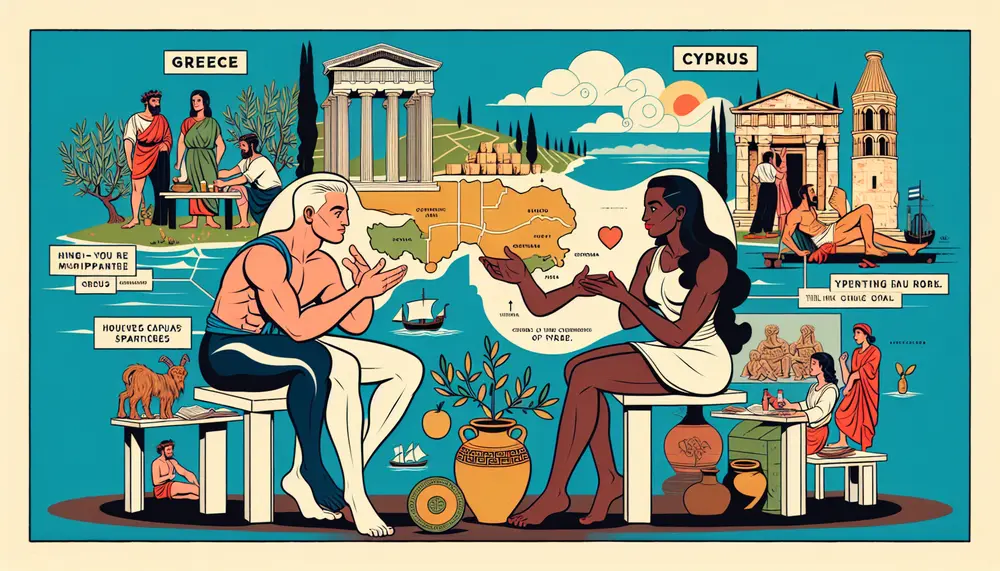Tourism
Tourism
Tourism in Cyprus
Tourism in Cyprus is a major industry and a key driver of the economy. The island attracts millions of visitors each year, thanks to its beautiful beaches, rich history, and vibrant culture.
Beaches and Natural Beauty
Cyprus is famous for its stunning beaches. Popular spots include Nissi Beach in Ayia Napa and Fig Tree Bay in Protaras. The island also offers scenic mountains and lush forests, perfect for hiking and nature lovers.
Historical Sites
Cyprus has a rich history that dates back thousands of years. Tourists can explore ancient ruins like the Tombs of the Kings in Paphos and the ancient city of Kourion. These sites offer a glimpse into the island's past and are must-see attractions.
Cultural Experiences
Visitors to Cyprus can enjoy a variety of cultural experiences. Traditional Cypriot cuisine, local festivals, and folk music are just a few examples. The island's diverse culture is a blend of Greek, Turkish, and Middle Eastern influences.
Accommodation and Travel
Cyprus offers a wide range of accommodation options, from luxury resorts to budget-friendly hotels. The island is well-connected with regular flights from major cities in Europe and beyond. Public transport and car rentals make it easy to explore the island.
Seasonal Tourism
Tourism in Cyprus is seasonal, with the peak season running from May to October. During this time, the weather is warm and sunny, making it ideal for beach holidays. Off-season travel can also be enjoyable, with fewer crowds and milder weather.
Economic Impact
Tourism significantly contributes to the Cypriot economy. It creates jobs, supports local businesses, and generates revenue. The government and private sector continuously invest in improving tourism infrastructure to enhance the visitor experience.
Blog Posts with the term: Tourism

Cyprus, located in the eastern Mediterranean Sea at the crossroads of Europe, Asia, and Africa, covers 9,251 square kilometers and features diverse landscapes including beaches and mountains. Despite its compact size compared to countries like Belgium or Luxembourg, Cyprus has...

The article provides a comprehensive guide for Indians planning to visit Cyprus, detailing the types of visas available and the general and specific requirements needed for a successful application. It emphasizes understanding visa categories like short-stay, multiple-entry, long-stay, airport transit,...

Driving in Cyprus involves navigating on the left side of the road, similar to the UK, and requires adjusting to local traffic laws and conditions. Key points include practicing safe driving habits, understanding speed limits and signage, being cautious on...

Cyprus has two official languages, Greek and Turkish, reflecting its diverse cultural heritage and historical influences. While Greek is predominantly spoken in the south and Turkish in the north, both languages coexist alongside various dialects and minority languages that contribute...

Cyprus, an island in the Eastern Mediterranean, has a complex history marked by division due to historical events and nationalist movements among Greek and Turkish Cypriots. The 1974 conflict escalated with a coup d'état followed by Turkey's military intervention, leading...

The relationship between Cyprus and Greece is deeply rooted in shared history, language, religion, and traditions. From ancient myths to modern political alliances, their connection has shaped both nations' identities and continues to foster strong cultural and economic ties today....

Cyprus boasts a rich and diverse culture shaped by various historical influences, including Greek, Phoenician, Roman, Byzantine, Ottoman, and British. The island's cultural identity is reflected in its language diversity (Greek Cypriot and Turkish Cypriot), religious practices (Orthodox Christianity and...

Cyprus is uniquely divided into the internationally recognized Republic of Cyprus in the south and the Turkish Republic of Northern Cyprus, only acknowledged by Turkey. This division reflects contrasting political systems, cultures, and economies while preserving distinct identities shaped by...

This guide provides comprehensive information on obtaining a Cyprus visa, detailing who needs one, the types of visas available, required documents, and the application process. It covers various categories such as tourist, business, student, work, transit, and family reunification visas...

Cyprus' strategic location in the eastern Mediterranean makes it a valuable asset for NATO, offering geographical advantages and military capabilities that enhance regional stability and security. Its proximity to key maritime routes, conflict zones, and its history of collaboration with...

Securing a Cyprus immigration work permit is essential for non-EU citizens wishing to work in the country, with various types available depending on employment needs and specific eligibility criteria that must be met....

The article provides a comprehensive guide to applying for a Cyprus Schengen Visa, detailing eligibility criteria, required documents, and the application process. It aims to simplify the steps involved and ensure applicants are well-prepared for a smooth visa application experience....

Cyprus, an island in the Mediterranean, boasts a rich tapestry of cultural traditions influenced by Greek, Roman, Byzantine, Ottoman, and British civilizations. This guide explores various aspects of Cypriot culture including festivals, music, literature, culinary delights, traditional arts and crafts...

Cyprus Paphos is a coastal city known for its rich history, cultural heritage, and attractions like the Kato Paphos Archaeological Park and Tombs of the Kings. It features significant landmarks such as Aphrodite's Rock and Sanctuary, along with Paphos Castle...
